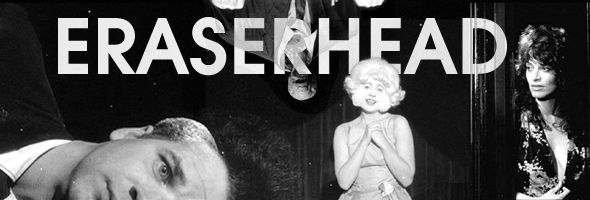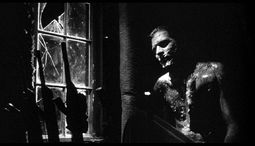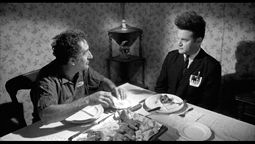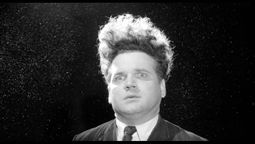
B&W, 1977, 88m. / Directed by David Lynch / Starring Jack Nance, Charlotte Stewart / David Lynch (US R1 NTSC), Comstock/Beam (Japan R2 NTSC), Paramount (France R2 PAL) / WS (1.85:1) (16:9), Universal (UK R2 PAL) / WS (1.85:1) / DD2.0
After an extended prologue in which a series of cosmic mechanisms mimic the process of birth (complete with monstrous spermatozoa), the fragmented storyline begins in a nameless town smothered in industrial grime and smog. Dumpy and socially afflicted Henry (the late Jack Nance) comes home to his dingy apartment, where his busty neighbor peers at him continuously from a half-closed door. At night he goes to the house of his girlfriend, Mary (Charlotte Stewart), where her parents engage in fractured conversation and serve him a twitching, bleeding chicken for dinner. As it turns out, Mary has been impregnated by Henry and given birth to a scrawny, malformed infant, so naturally mother and child move in with him. Thanks to sleepless nights spent with his twitching common law spouse and the mewling baby, Henry soon drifts off into a fantasy world governed by a platinum-haired, plump-cheeked, singing lady who lives in his radiator.
A key player in the midnight movie revolution of the 1970s, the surreal and often inscrutable Eraserhead marked the feature film debut of David Lynch, aided by an American Film Institute grant and a squad of fearless, possibly insane cinematic conspirators. Lensed in gloomy black and white, the film today works best as a surprisingly thorough primer in the visual motifs which would come to dominate Lynch's later films and television work.

 Best viewed late at night in a hazy state of mind, Eraserhead brims with unsettling images of bodily assault and decay, sexual revulsion, unidentifiable mechanical constructions, and shadowy hallways staggered with malfunctioning elevators and bizarre plantlife. Though still off-putting to many viewers, this is in many respects a keystone to future science fiction, horror and avant garde filmmaking; there simply wouldn't be a Delicateseen, Seven, Brazil, Combat Shock, or Irreversible without it. The film's most lyrical and chilling moment, a performance of the eerie "In Heaven, Everything Is Fine," foreshadows Lynch's Roy Orbison microphone reveries in Blue Velvet and Mulholland Dr., while the audacious cosmic finale was later repeated (in a different context) in The Elephant Man, The Straight Story, and the opening of Dune. Finally there's the groundbreaking sound mix, a disconcerting mixture of low rumblings, metallic scraping, and industrial chugging which anticipates the sonic experimentation of Lost Highway and other industrial music-related projects. A must for Lynch fans and curious viewing for almost anyone else, Eraserhead is an experience few geniunely enjoy but none ever forget.
Best viewed late at night in a hazy state of mind, Eraserhead brims with unsettling images of bodily assault and decay, sexual revulsion, unidentifiable mechanical constructions, and shadowy hallways staggered with malfunctioning elevators and bizarre plantlife. Though still off-putting to many viewers, this is in many respects a keystone to future science fiction, horror and avant garde filmmaking; there simply wouldn't be a Delicateseen, Seven, Brazil, Combat Shock, or Irreversible without it. The film's most lyrical and chilling moment, a performance of the eerie "In Heaven, Everything Is Fine," foreshadows Lynch's Roy Orbison microphone reveries in Blue Velvet and Mulholland Dr., while the audacious cosmic finale was later repeated (in a different context) in The Elephant Man, The Straight Story, and the opening of Dune. Finally there's the groundbreaking sound mix, a disconcerting mixture of low rumblings, metallic scraping, and industrial chugging which anticipates the sonic experimentation of Lost Highway and other industrial music-related projects. A must for Lynch fans and curious viewing for almost anyone else, Eraserhead is an experience few geniunely enjoy but none ever forget.
 David Lynch's decision to create and distribute Eraserhead on DVD by himself is something of an industry anomaly, particularly considering the film's rabid cult following. Previous editions available in England, France and Japan contained watchable and sometimes impressive widescreen transfers, certainly leagues above the muddy Columbia tapes and bootlegs which afflicted viewers' eyes for years. Lynch's DVD, cleaned up frame by frame from an interneg transfer, looks exceptionally good and wonderfully film-like. Apart from the inherent graininess of some outdoor daylight shots, there's nary a quibble to make with the transfer. The 2.0 surround audio (listed as uncompressed PCM in the notes, though it registers as Dolby Digital) delivers an admirable sonic presentation of the film, and while it's not quite as aggressive as the surround mix on the Japanese laserdisc, it's more than enough to convey the film's sonic palette and sounds remarkably textured. Housed in an oversized box (emblazoned with "DVD 2000" for some reason), the disc comes with an illustrated booklet containing poster reproductions, an outline excerpt, a storyboard page, and several stills. The supplements (accessible from rather long menus of Nance's shoes tied to the dead cat) include the oft-seen theatrical trailer and, more importantly, an 84-minute documentary (simply titled "Stories"). Shot in full frame black and white, this behind the scenes retrospective features Lynch at his familiar microphone in front of curtains (as seen in his Short Films DVD) reminiscing about the making of the film, from its inception in the early '70s through the entire shooting process. Accompanied by a continuous windy sound effect and a barrage of still photos, he provides a consistently interesting tour of the film's history. Some grainy video footage of the shooting is also included, along with a thumbnail sketch of various deleted scenes scrapped either during shooting or the final assembly. Assistant director Catherine Coulson also chimes in via speakerphone for a lengthy conversation with Lynch in which they discuss such subjects as the effect of Nance's bizarre haircut on his everday life. It's a pricey package to be sure, but Lynch fans won't hesitate to add this oversized oddity to their digital collections.
David Lynch's decision to create and distribute Eraserhead on DVD by himself is something of an industry anomaly, particularly considering the film's rabid cult following. Previous editions available in England, France and Japan contained watchable and sometimes impressive widescreen transfers, certainly leagues above the muddy Columbia tapes and bootlegs which afflicted viewers' eyes for years. Lynch's DVD, cleaned up frame by frame from an interneg transfer, looks exceptionally good and wonderfully film-like. Apart from the inherent graininess of some outdoor daylight shots, there's nary a quibble to make with the transfer. The 2.0 surround audio (listed as uncompressed PCM in the notes, though it registers as Dolby Digital) delivers an admirable sonic presentation of the film, and while it's not quite as aggressive as the surround mix on the Japanese laserdisc, it's more than enough to convey the film's sonic palette and sounds remarkably textured. Housed in an oversized box (emblazoned with "DVD 2000" for some reason), the disc comes with an illustrated booklet containing poster reproductions, an outline excerpt, a storyboard page, and several stills. The supplements (accessible from rather long menus of Nance's shoes tied to the dead cat) include the oft-seen theatrical trailer and, more importantly, an 84-minute documentary (simply titled "Stories"). Shot in full frame black and white, this behind the scenes retrospective features Lynch at his familiar microphone in front of curtains (as seen in his Short Films DVD) reminiscing about the making of the film, from its inception in the early '70s through the entire shooting process. Accompanied by a continuous windy sound effect and a barrage of still photos, he provides a consistently interesting tour of the film's history. Some grainy video footage of the shooting is also included, along with a thumbnail sketch of various deleted scenes scrapped either during shooting or the final assembly. Assistant director Catherine Coulson also chimes in via speakerphone for a lengthy conversation with Lynch in which they discuss such subjects as the effect of Nance's bizarre haircut on his everday life. It's a pricey package to be sure, but Lynch fans won't hesitate to add this oversized oddity to their digital collections.
